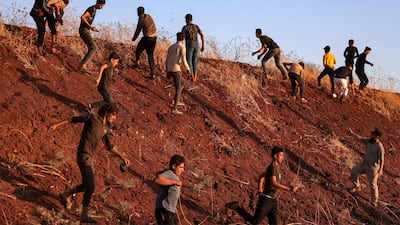Turkey reopened a main crossing with Syria on Wednesday to defuse unrest in areas under its control which has threatened to undermine its position as an outside player in the civil war, sources in the Syrian opposition aligned with Ankara said.
The move eases a blockade Turkey imposed after its interests in the area were attacked and four Syrians were killed in violence this week.
“The movement of passengers and lorries have returned to normal, starting today,” the administration of the Syrian side of the Bab Al Hawa crossing said.
The crossing is situated between the Turkish province of Hatay and the Syrian province of Idlib.
The Turkish government is one of four outside powers that have carved out territory in Syria during the course of the 13-year civil war. It has formed proxy forces and built up channels with Sunni extremist groups to counter secular Kurdish militias backed by the US, and Shiite militants aligned with Iran, as well as groups supported by Russia.
The unrest in the Turkish zone in Syria, comprising parts of the northern Idlib and Aleppo provinces, occurred as Syrian refugees in Turkey came under renewed mass attacks.
The outrage against Ankara was also in reaction to Turkish authorities mulling a rapprochement with President Bashar Al Assad, after years of supporting the mainly Sunni opposition to the Alawite dominated rule in Syria.
Turkey is the main supplier of goods to the northern opposition areas outside the control of Damascus, which border regime areas, and areas taken over by Kurdish militias supported by Washington.
A member of the Syrian opposition said that Turkey appears to be realising that its foes in Syria, particularly Kurdish militants, stand to gain if it “keeps pressuring people in the north”.
Bab Al Hawa is one of four border crossings between Turkey and areas controlled by its allies in Syria that have been shut this week. Other crossings have been closed for years because they border regime areas, or areas under Kurdish militia rule.
Bab Al Hawa is run by the Salvation Government, which is controlled by Hayat Tahrir Al Sham, an offshoot of Al Nusra Front which has links to Turkey.
About four million people live in areas under Turkish influence in northern Syria. The region comprises mainly areas controlled by Hayat Tahrir Al Sham, and the Syrian National Army, a militia set up by Ankara in 2017. A large component of the Syrian National Army are former rebels who had been defeated since the Russian intervention on the side of the Syrian regime in 2015.
Another three million Syrians refugees live in Turkey. Most of them had fled a crackdown on the 2011 revolt against the Assad rule in Damascus, and the ensuing civil war.
Turkish authorities said on Tuesday that security forces have detained almost 500 people in connection with attacks on Syrian citizens in Turkey.
Videos posted online last night showed more attacks on Syrians and Syrian shops in the city of Gaziantep, near the border with Syria, as Turkish officials tried to defuse tensions.
Turkish President Recep Tayyip Erdogan renewed his vow to return more Syrian refugees back across the border, with Turkish authorities having forced thousands to resettle in areas under Ankara's control in Syria. Ankara insists the returns are voluntary.
About 670,000 Syrians have been resettled in those area, according to the government.
“One million more people will be added to this,” Mr Erdogan said on Tuesday.
“We will resolve the issue of refugees within a rational and conscientious framework, not on the basis of prejudices and fears,” he said.
Amid reports of the Turkish government considering peace talks with Mr Assad, Syrians in Turkey remain fearful of the prospect of returning, afraid of his iron fisted rule.
“If we are sent back, and if we go to the Syrian regime areas, we are returning to death,” one refugee in Gaziantep said.

